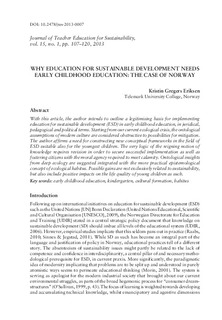Why Education for Sustainable Development Needs Early Childhood Education: The Case of Norway
Journal article, Peer reviewed
Published version
Permanent lenke
http://hdl.handle.net/11250/2438178Utgivelsesdato
2013-07-11Metadata
Vis full innførselSamlinger
- Institutt for pedagogikk [285]
Originalversjon
Eriksen, K.G. Why Education for Sustainable Development Needs Early Childhood Education: The Case of Norway. Teacher Education for Sustainability. 2013, 15(1), p. 107-120 http://dx.doi.org/10.2478/jtes-2013-0007Sammendrag
With this article, the author intends to outline a legitimising basis for implementing education for sustainable development (ESD) in early childhood education, in juridical, pedagogical and political terms. Starting from our current ecological crisis, the ontological assumptions of modern culture are considered obstructive to possibilities for mitigation. The author affirms a need for constructing new conceptual frameworks in the field of ESD suitable also for the youngest children. The very logic of the reigning notion of knowledge requires revision in order to secure successful implementation as well as fostering citizens with the moral agency required to meet calamity. Ontological insights from deep ecology are suggested integrated with the more practical epistemological concept of ecological habitus. Possible gains are not exclusively related to sustainability, but also include positive impacts on the life quality of young children as such.

